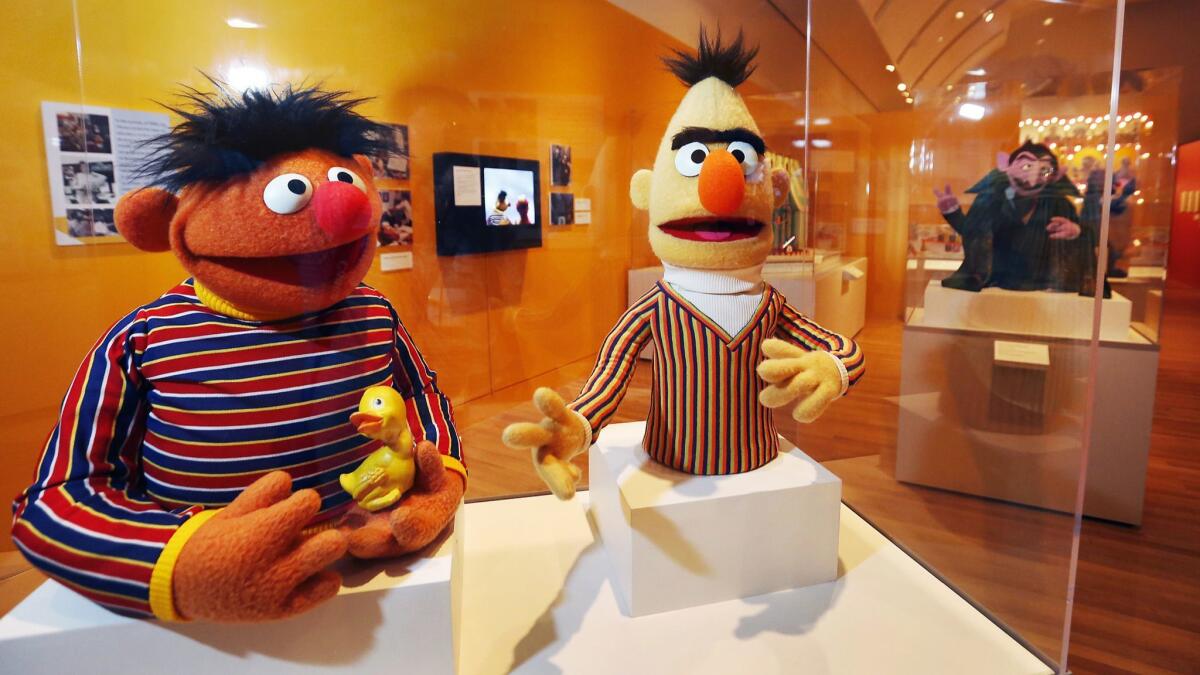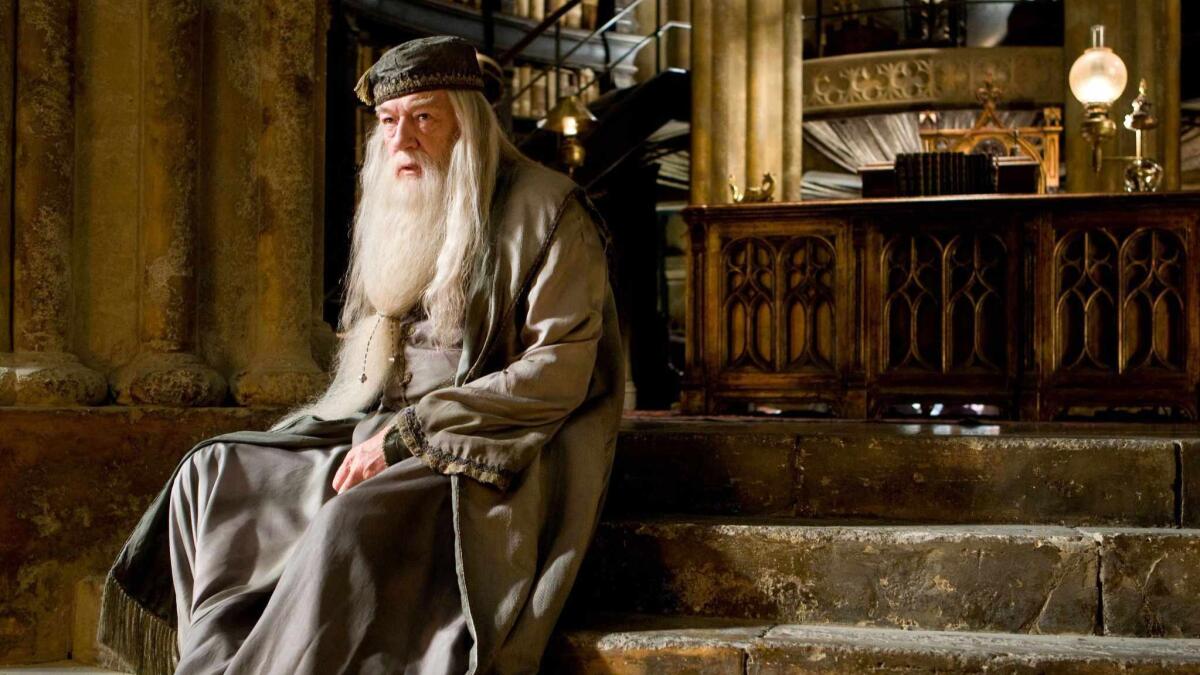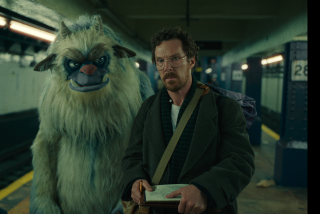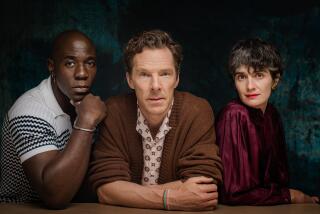Are Ernie and Bert gay? Who gets to say?

- Share via
If you had the misfortune to be on the Internet this week — and who among us was not, alas? – then you’ll know there was a bit of excitement around the Sesame Street characters Bert and Ernie. In an interview with Queerty, former Sesame Street writer Mark Saltzman said that while he was a writer on the show, he imagined the two Muppet roommates as a gay couple, basing them a bit off himself and his late partner Arnold Glassman.
Twitter exploded over this, causing the Sesame Workshop to issue a tweet that Bert and Ernie did not have a sexual orientation. Twitter exploded over this too, and then legendary puppeteer and director Frank Oz chimed in, saying that when he created the character of Bert, he did not see him as gay. Twitter, you may have sensed a theme by now, exploded.
And, well? Are Bert and Ernie a couple? The question is not just one of representation (although of course it is a question of representation), but it’s also a question about authorial intent, and who, if anyone, gets to speak with authority about the nature of the characters and stories that are presented to the public.
Sometimes, the answer to this question is seemingly easy. A novel, for example, (usually) has a single author, who is also (usually) the holder of the intellectual property rights. So the author can speak with significant authority about the nature of the characters and story, bolstered both by the text and by their own background knowledge of the universe of the novel. The novelist will always know more about the world they create than what shows up on the page, so occasionally what they will know will surprise people.

Most famously, J.K. Rowling set up a row a decade ago when she said that Albus Dumbledore, the wizard headmaster of the Harry Potter books, was gay. This caused an uproar, but Rowling was in a position to know — she had written the books, knew the character well, and also, during the production of the movies, steered screenwriter Steve Kloves away from a character moment suggesting Dumbledore was straight, before the public acknowledgement of the wizard’s sexuality. Gay Dumbledore is canon, because Rowling said so, and it’s accepted enough that, these days, the issue isn’t whether he’s gay, but whether that sexuality is adequately represented in the current Fantastic Beasts series of films.
That hints at a pressing question: what about when the creator isn’t the sole owner or author of a character? This is, in fact, the default state for film, and television, and major comic book producers and video game makers. The rights to the intellectual property are held by a corporation, not the creator of the character or story. Likewise, the creator of the characters and story aren’t the ones who write them solely, or often, at all. As a result, characters and stories can wander far afield from the creator’s original “authorial intent” — think of how many times Batman, Superman and Spider-Man have been rebooted and their origin stories retold, across multiple media (not to mention James Bond, or Godzilla, or the Power Rangers or Captain Kirk…), or how drastically a filmed version of a story can diverge from the original novel, and you begin to see the issue.
In the case of Bert and Ernie, whose “authorial intent” should you go with? That of the man who created Bert? That of the corporation that owns the right to the characters? Or that of the man who wrote them for a decade and a half?
(“Why do we have to have this argument at all? They’re puppets, for crying out loud” is a common refrain here. Well, anyone who doesn’t think puppets can’t have very certain sexualities is invited to see a showing of “Avenue Q” or “Meet the Feebles.” But more than that, puppets are just fictional characters like any others. Fictional characters not only can have the entire range of human characteristics, but when they don’t, it’s poor fiction and world-building. People may not want to confront whether Bert and Ernie are a couple, and many in Sesame Street’s viewer demographic won’t know to care one way or another, but it doesn’t mean the question can’t be asked, particularly regarding a show that has for decades consistently championed diversity.)
No formulation is perfect, but here is a good thumbnail for discussing the value of authorial intent when discussing a work:
The argument of authorial intent is more persuasive the more control the author has over the work. A novelist’s view of characters she’s solely created is likely to have more gravity than that of a creator who is now years away from the genesis of a character, over which he now has no control.
But even then, there are limits. If a novelist suddenly argues a character’s motivations or intentions are something that are completely contradicted in the text, people may choose not to give the author’s latter-day statements much credence. Likewise, if an author writes sequels that their readers find unrepresentative, readers may decide that the “canon” for the world drops away after the initial novel.
And importantly, authors are not creatures who perfectly understand themselves. It’s possible, as much as we hate to admit it, that there are things in the text that authors aren’t aware of until someone else points them out. Authors know a lot about their work; they even know more about their work than anyone else. But it’s also possible they don’t know everything.
Let’s also note that creators can’t control what people see in their characters once the characters are out in the world — we can build the worlds we create how we want and establish our characters with as much certainty as we can. But the reader (and viewer and player) then take them into their brain and do what they want with them. Sometimes that ends up being… different than what the creators expected. The way I handle that as a novelist is to explain to reader that they can believe whatever they like about my characters, just don’t expect my canonical text to match up to their imaginings 100%.
With Bert and Ernie, I entirely believe that Frank Oz did not create Bert to be gay. I entirely believe Mark Saltzman wrote the two characters as a loving gay couple. I entirely believe Sesame Workshop would love for people not to wonder if Bert and Ernie were anything other than best friends. All of these can be true simultaneously; all of these can be intended simultaneously. You get to decide which you want to believe more. That’s how it works.
John Scalzi’s next novel, “The Consuming Fire,” will be published in October.
More to Read
Sign up for our Book Club newsletter
Get the latest news, events and more from the Los Angeles Times Book Club, and help us get L.A. reading and talking.
You may occasionally receive promotional content from the Los Angeles Times.






